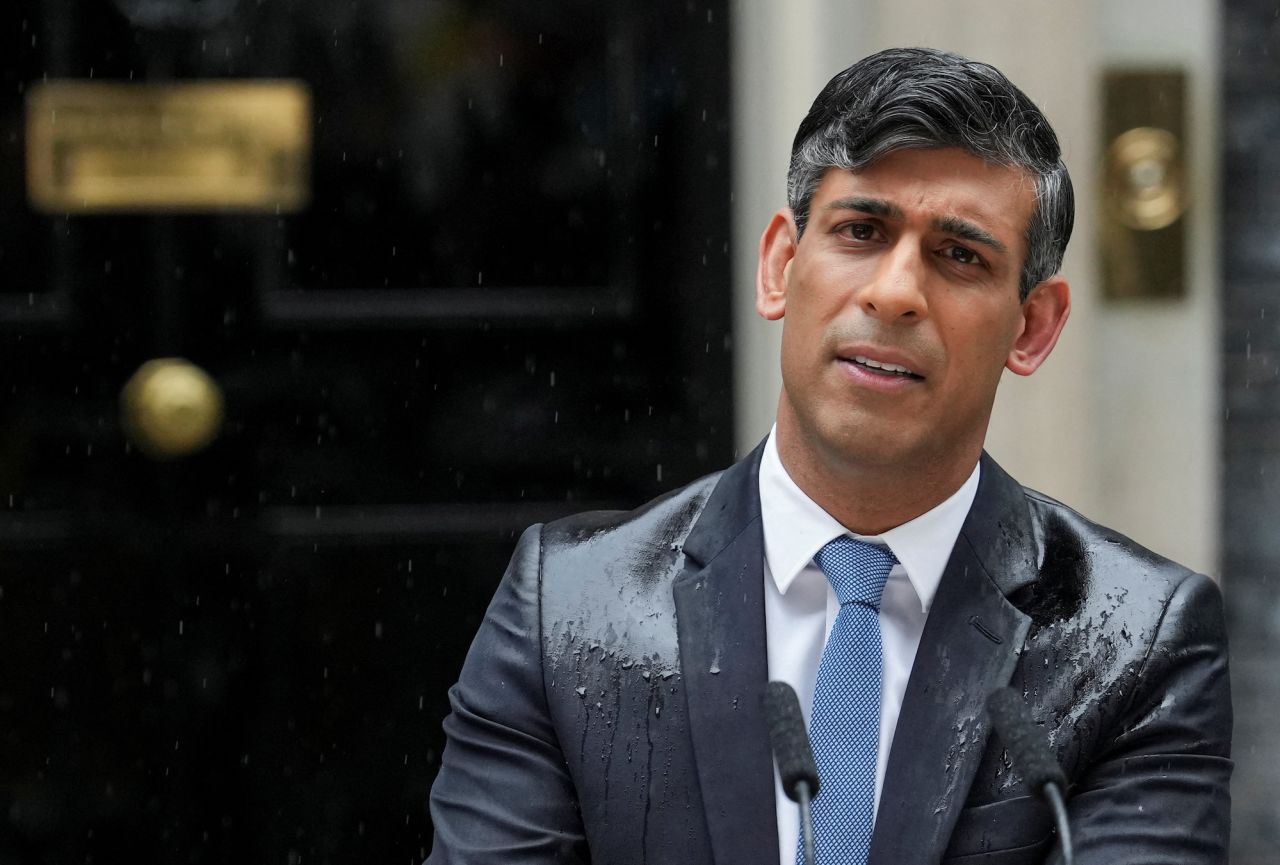LONDON (CNN) — When British Prime Minister Rishi Sunak announced on Wednesday that the country would hold a general election on July 4, many observers wondered why now.
More importantly, why did the Prime Minister call an election that he is almost certain to lose? For months, opinion polls have placed Sunak’s Conservative Party behind the opposition Labor Party, and under the current circumstances, Labor leader Keir Starmer would not only win the job, but would receive a large parliamentary majority.
The answer to this question is simple: a better time is unlikely to come. Everything Sunak is trying seems to be going wrong, and it is not unlikely that his popularity will get worse before the year is out.
The past few days have been relatively good for Sunak. The economy appears to be recovering, with the International Monetary Fund (IMF) updating its UK growth forecasts and inflation finally returning to something resembling a normal level.
Nothing went disastrously wrong in the last week before the election was called. It’s a low bar, but since he’s been in office, he probably now has the most stable foundation on which to launch a campaign he’s ever had or will ever have.

British Prime Minister Rishi Sunak delivers a speech calling for a general election outside 10 Downing Street in London on May 22. Photograph: Maja Smijkowska/Reuters
As one of Sunak’s senior advisers told CNN:
“The Prime Minister came into office facing a number of major challenges: inflation, lack of growth, and migration. His main task was to address these problems. He has made real and important progress in this regard. On Tuesday, the IMF improved our situation and growth forecasts. Yesterday we saw how inflation returned to normal levels; today we see how immigration has decreased as a result of our reforms.
“So we have a solid basis for saying things are going in the right direction, and the view was that now is the best time to address the country and say ‘this is what we did, our plan is working, now who did we do it for?’ Who do you think? Who has the plan and the ability to take action.” Bold steps to move this country toward a safer future.
Constitutionally, Sunak should have called the election before the end of this year. The fact that he had not done so until this week allowed his opponents to portray him as a coward, afraid to face the public.
It did not help that the country had long felt the need for elections, nor that the Conservative Party had looked from the outside to be a hopeless case for several years.
His term did not start in the best way. In 2010, after 13 years of Labor government, David Cameron won the general election, but failed to obtain a majority in Parliament. He was forced to form a coalition government with the centrist Liberal Democrats.
Against all odds, Cameron succeeded in holding the coalition together until the 2015 election, in which he won a surprise majority and secured the first fully Conservative government since 1997.
The celebrations did not last long. The holding of the Brexit referendum in 2016 split his party in two and made government almost impossible for his four (yes, four) successors. The first was Theresa May.
A failed snap election and failure to pass a Brexit deal because her party hated it ended May’s rule, and she was replaced by Boris Johnson in 2019. Johnson destroyed his majority when he became burdened by scandal, including Downing’s notorious illegal parties. Street during the Covid-19 pandemic forced him to resign in 2022.

Sunak (centre) shows off his bottling machine during a campaign visit to the Vale of Glamorgan brewery in Barry, south Wales, on Thursday. Photograph: Henry Nicholls/AFP/Getty Images
Liz Truss was in office for 45 days, during which time she wreaked enough economic havoc, sending the pound to record lows against the dollar, interest rates soaring, and inflation skyrocketing. In the end, the Tories tired of the chaos and put Sunak at the helm of government as a safe hand.
Whether or not it is is debatable. Despite what conservative sources may say about his path to power, his poor rating in opinion polls cannot be denied.
His main immigration policy, sending illegal immigrants to Rwanda to process their asylum claims, has already cost millions, even though just one person – voluntarily and with the money to do so – made the trip.
The world-leading smoking ban, which caused major embarrassment for Sunak when it was not approved by his MPs, has been postponed due to the election.
These are just two recent examples of how things have gone wrong for Sunak. But what hurts him most is the prevailing feeling that he is a loser and that his party does not trust him very much. No amount of facts, figures, or clichés can change the undeniable smell of failure that surrounds you. The feeling that nothing is inevitable is a strong one in politics, and for Sunak, defeat seems inevitable.
Of course it’s not. There is a possibility that the polls will mislead us, and there is a possibility that the Conservative campaign will succeed.
They are making it personal: a clear choice between Labor leader Starmer and Sunak. The Conservatives claim that Starmer cannot be trusted on national security, is an unprincipled opportunist and has no plan.
Perhaps now is the best time to convey this message. Labor will have to rush out its statement, which will inevitably be torn apart by commentators. The longer Sunak delays, the more time Labor will have to put its house in order.
No one can deny that Sunak inherited a disaster. At present, it seems unlikely that he will have cleaned up the mess enough to enable the Conservatives to win another term. But given the scale of the task ahead of us, it makes sense to take advantage of this rare period of good news and hope for the best.
